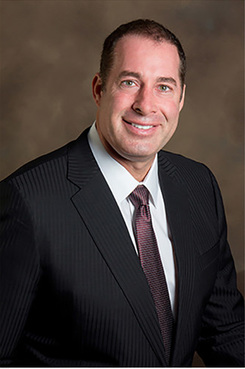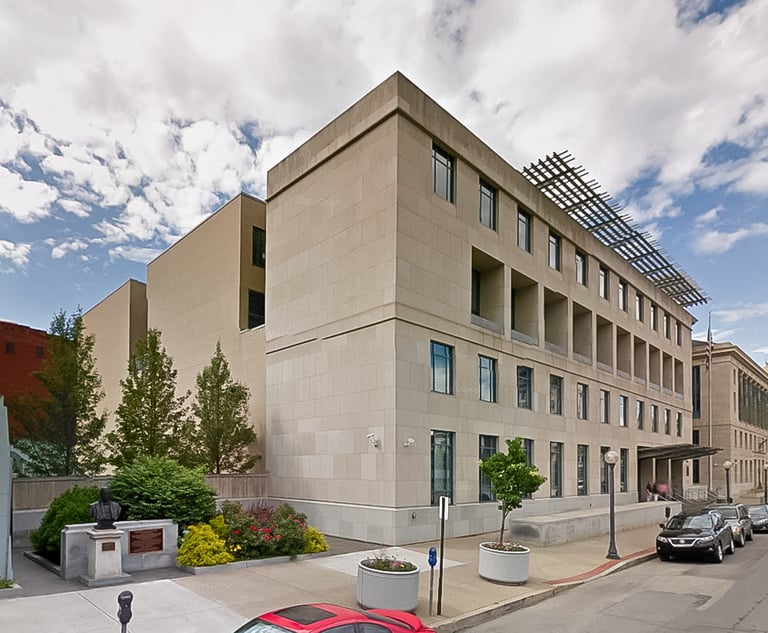New PBA President Chuck Eppolito Has an Eye on Tech
White and Williams partner Charles Eppolito III takes over as president of the Pennsylvania Bar Association on May 11.
May 03, 2018 at 02:19 PM
4 minute read
 Philadelphia skyline. Photo by Shutterstock
Philadelphia skyline. Photo by Shutterstock The Philadelphia lawyer taking leadership of the Pennsylvania Bar Association is making technology central to his goals for the coming year.
White and Williams partner Charles Eppolito III is set to become president of the PBA on May 11. As president-elect for the past year, Eppolito spearheaded the creation of a cybersecurity and data privacy committee, which officially launched just a few weeks ago.
 Chuck Eppolito III.
Chuck Eppolito III. “The charge of that committee is to analyze cybersecurity issues and educate members,” he said, noting that it will include lawyers from all sizes of firms and government entities, as well as judges. “We're going to advocate for best practices and environments that mitigate security concerns.”
But that committee isn't the only update to PBA technology. The PBA recently launched a redesigned website, and is looking for other ways to utilize technology to better serve members.
“We want to do more to help our lawyers practice effectively and efficiently,” Eppolito said.
That includes lawyers from all sizes of firms, he noted. Having practiced law in Centre County, Dauphin County and now Philadelphia, Eppolito said he has an understanding of the various perspectives firms from those areas bring to the PBA.
He also said he is working to “energize” the PBA's long-existing large law firm committee. One of the tasks he hopes they will take on, he said, is analyzing how law firms can make better use of alternative fee arrangements.
“We always want all lawyers in Pennsylvania to be engaged and be more engaged,” he said. “We do have a large number of lawyers from large firms. We want more.”
One way those large firms could be helped by the PBA is in local legislative efforts, Eppolito said. Even the largest law firms are unlikely to have the representation the PBA has to advocate for issues affecting the legal profession in Pennsylvania legislative matters.
Eppolito said he plans to travel the state and get to know more of its law firms and lawyers. The PBA creates opportunities for them to contribute to publications and continuing legal education, he noted, which might get more firms involved.
As of late, the PBA has an increasing CLE function, having absorbed the administrative and governance functions of the Pennsylvania Bar Institute. The PBI was already a subsidiary of the PBA, but it had run into financial troubles in recent years, cutting into reserves to cover expenses.
The PBI board, which has many members in common with the PBA board, voted to eliminate the officers and directors of the PBI. Outgoing PBA president Sharon Lopez said the decision was not made lightly, and PBI is now being assessed to determine how it should proceed. Property leases and personnel costs will be taken into account, Lopez said.
“It was clear that in order to keep the gold standard of CLE in the marketplace and in order to preserve the brand that PBI has … immediate action had to be taken,” Lopez said.
Regarding Eppolito's assumption of the PBA presidency, Lopez said she's confident in his leadership style and message.
“Our demographic of license holders in Pennsylvania is changing,” she said. “Chuck shares my commitment to making sure there's active engagement in membership recruitment.”
Lopez has served as president of the organization since last May. Anne John is set to become the incoming president, and will serve as president beginning in May 2019.
This content has been archived. It is available through our partners, LexisNexis® and Bloomberg Law.
To view this content, please continue to their sites.
Not a Lexis Subscriber?
Subscribe Now
Not a Bloomberg Law Subscriber?
Subscribe Now
NOT FOR REPRINT
© 2025 ALM Global, LLC, All Rights Reserved. Request academic re-use from www.copyright.com. All other uses, submit a request to [email protected]. For more information visit Asset & Logo Licensing.
You Might Like
View All
Middle District of Pennsylvania's U.S. Attorney Announces Resignation
2 minute read
High Court Revives Kleinbard's Bid to Collect $70K in Legal Fees From Lancaster DA
4 minute read
Immunity for Mental Health Care and Coverage for CBD: What's on the Pa. High Court's November Calendar
5 minute read
Slip-and-Fall Suit Cleared to Proceed Against Kalahari Indoor Waterpark
3 minute readTrending Stories
Who Got The Work
J. Brugh Lower of Gibbons has entered an appearance for industrial equipment supplier Devco Corporation in a pending trademark infringement lawsuit. The suit, accusing the defendant of selling knock-off Graco products, was filed Dec. 18 in New Jersey District Court by Rivkin Radler on behalf of Graco Inc. and Graco Minnesota. The case, assigned to U.S. District Judge Zahid N. Quraishi, is 3:24-cv-11294, Graco Inc. et al v. Devco Corporation.
Who Got The Work
Rebecca Maller-Stein and Kent A. Yalowitz of Arnold & Porter Kaye Scholer have entered their appearances for Hanaco Venture Capital and its executives, Lior Prosor and David Frankel, in a pending securities lawsuit. The action, filed on Dec. 24 in New York Southern District Court by Zell, Aron & Co. on behalf of Goldeneye Advisors, accuses the defendants of negligently and fraudulently managing the plaintiff's $1 million investment. The case, assigned to U.S. District Judge Vernon S. Broderick, is 1:24-cv-09918, Goldeneye Advisors, LLC v. Hanaco Venture Capital, Ltd. et al.
Who Got The Work
Attorneys from A&O Shearman has stepped in as defense counsel for Toronto-Dominion Bank and other defendants in a pending securities class action. The suit, filed Dec. 11 in New York Southern District Court by Bleichmar Fonti & Auld, accuses the defendants of concealing the bank's 'pervasive' deficiencies in regards to its compliance with the Bank Secrecy Act and the quality of its anti-money laundering controls. The case, assigned to U.S. District Judge Arun Subramanian, is 1:24-cv-09445, Gonzalez v. The Toronto-Dominion Bank et al.
Who Got The Work
Crown Castle International, a Pennsylvania company providing shared communications infrastructure, has turned to Luke D. Wolf of Gordon Rees Scully Mansukhani to fend off a pending breach-of-contract lawsuit. The court action, filed Nov. 25 in Michigan Eastern District Court by Hooper Hathaway PC on behalf of The Town Residences LLC, accuses Crown Castle of failing to transfer approximately $30,000 in utility payments from T-Mobile in breach of a roof-top lease and assignment agreement. The case, assigned to U.S. District Judge Susan K. Declercq, is 2:24-cv-13131, The Town Residences LLC v. T-Mobile US, Inc. et al.
Who Got The Work
Wilfred P. Coronato and Daniel M. Schwartz of McCarter & English have stepped in as defense counsel to Electrolux Home Products Inc. in a pending product liability lawsuit. The court action, filed Nov. 26 in New York Eastern District Court by Poulos Lopiccolo PC and Nagel Rice LLP on behalf of David Stern, alleges that the defendant's refrigerators’ drawers and shelving repeatedly break and fall apart within months after purchase. The case, assigned to U.S. District Judge Joan M. Azrack, is 2:24-cv-08204, Stern v. Electrolux Home Products, Inc.
Featured Firms
Law Offices of Gary Martin Hays & Associates, P.C.
(470) 294-1674
Law Offices of Mark E. Salomone
(857) 444-6468
Smith & Hassler
(713) 739-1250





